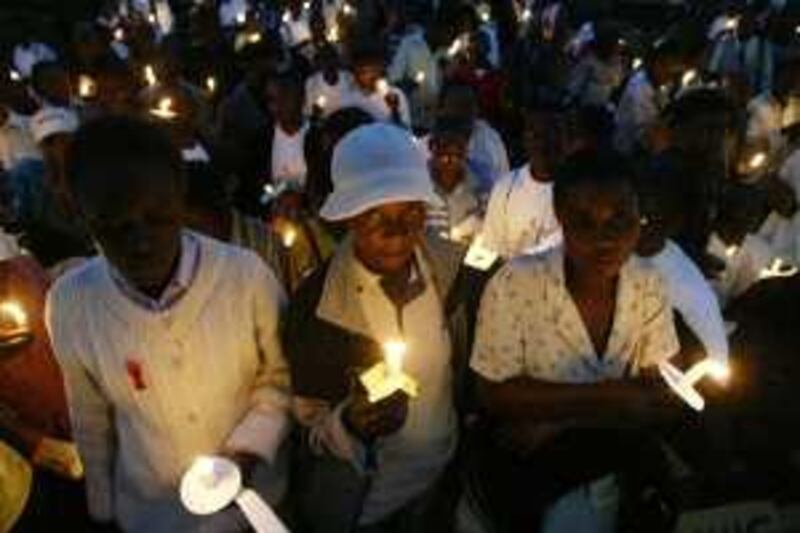BULAWAYO, ZIMBABWE // Two recently published studies on Zimbabwe's declining Aids rate claim that the fight against the epidemic might have actually benefited from the acute poverty brought on by a decade-long economic disaster, as more people retreated into their homes to focus on survival rather than engage in the dangerous behaviour. The country is slowly emerging from a crisis that saw an 80 per cent unemployment rate and inflation of 230 million per cent. Michael Silverman, a Canadian infectious diseases expert working at Howard Hospital, 600km north of Bulawayo, and David Katzenstein, a professor in the same field at California's Stanford University, told an international Aids conference in South Africa recently that Zimbabwe's HIV prevalence rate fell to 11 per cent by December from 23 per cent in 2001 because hunger and poverty weakened people's sexual appetite and ability to afford prostitutes. "A lot of the effect [of the decline in HIV infections] is from the collapsing economy," Mr Silverman said. "You can't pay the sex worker if you have no currency. It's hard to have an [illicit] relationship if you're always in earshot of your spouse because you can't afford to travel. Because of the economic collapse, people are forced to stay home, like being in quarantine." Mr Katzenstein said: "Lack of transport, lack of money, lack of food, all decrease the amount of sex that you can have and the number of partners." But some Zimbabweans are angry at what they see as a patronising attitude towards them by the two scientists. They say the men ignored the years of work to raise awareness by local health organisations. Joshua Chogodora, a resource centre administrator at the Southern Africa Aids Information Dissemination Service (SafAids), a non-governmental organisation, said the economic malaise may have had a small positive effect, but Zimbabwe has other successful interventions that curbed the spread of Aids. "Overall, the two gentlemen's so-called findings are not scientific," he said. "What they said is contrary to a scientifically proven fact that in communities where there is high poverty, sex work is most prevalent." He said a high national literacy rate (the official figure is 97 per cent) that facilitates easier comprehension of prevention messages, increased condom use, improved awareness and positive behaviour, were the biggest contributors to the decline. In 2006 Zimbabwe led Africa in condom use and sales. More than 163 million male condoms and 3.8 million female condoms have been sold since 2001, said Britain's department for international development, which funds Population Services International, one of the biggest non-governmental organisations active in Zimbabwe's health sector. The male condoms sold represented the highest figure in Africa, while the number of female condoms sold was the highest in the world. Paul Chimedza, a local doctor, said the scientists' findings are "mischievous". "Sometimes one gets a sense of bitterness and anger in some people over anything positive that happens in Zimbabwe," he wrote in the government-run Sunday Mail newspaper, in an opinion piece headlined, Aids presentation demeans Zimbabweans. "There is always a stampede to water down or explain away anything good from this country. Zimbabwean stakeholders in the health and social sectors have worked hard to inform and educate the nation about the dangers of Aids. Zimbabweans in general are an educated lot. Why is it so difficult to say that they got the message and reduced their risky behaviour and give them a pat on the back?" Aids cases in Zimbabwe have continued to decline in recent years as the economy fell apart, Mr Katzenstein said. He said there is no evidence of similar developments in more economically stable countries such as Botswana and South Africa which, along with Namibia, ran big Aids awareness campaigns with the involvement of western-funded NGOs. The economic crisis crippled the government's capacity to provide medical drugs to Aids patients. Poverty and hunger were, and still are, prevalent, creating what Dr Chimedza said is an ideal environment for a greater Aids crisis. "It is a classic case of attempting to cover crass stupidity under the veneer of science," Issachar Mukucha, an Aids activist said of Mr Silverman and Mr Katzenstein's findings. Whatever the reasons for the decline in the country's Aids rate, health workers and awareness activists will be heartened by news last week that researchers in Thailand found that an experimental vaccine, for the first time, prevented the infection of the Aids virus, cutting the risk of becoming infected with HIV by more than 31 per cent, a watershed event in the fight against the deadly epidemic. The study used strains of HIV common in Thailand, however, and it is unknown whether such a vaccine would work against strains in Africa or elsewhere in the world. * With additional reporting by the Associated Press
Anger greets Aids researchers' conclusions
Local activists say scientists who credit years of poverty for a decline in HIV infection rates ignore the success of awareness campaigns.

More from the national




